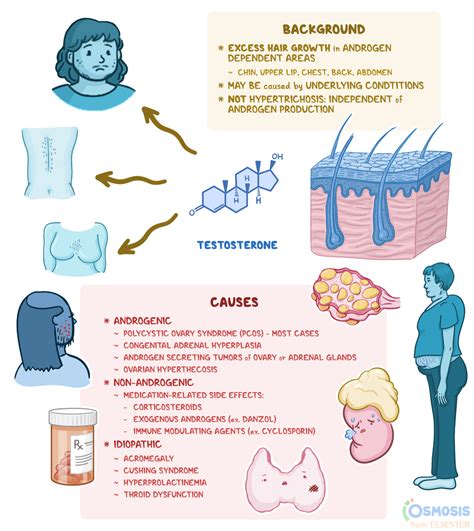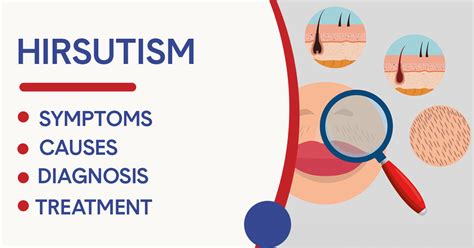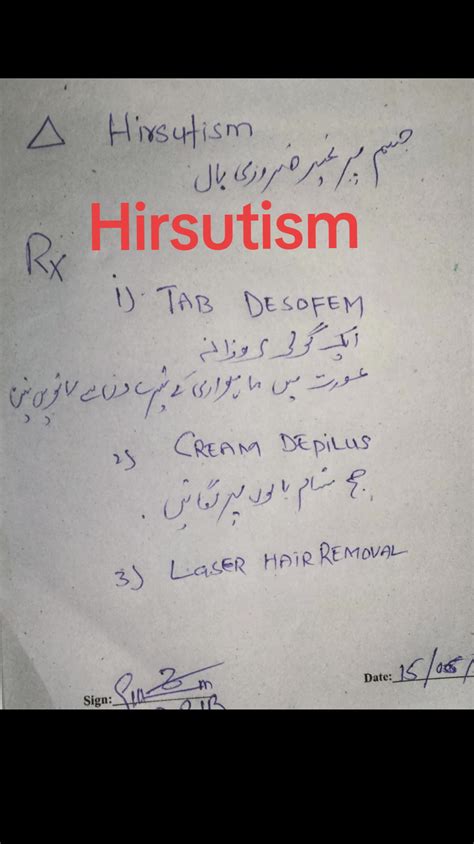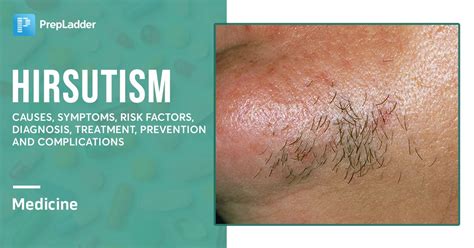Intro
Learn about Hirsutism, a hormonal condition causing excessive hair growth, and discover its symptoms, causes, and treatments, including polycystic ovary syndrome (PCOS) and androgen imbalance.
Hirsutism is a medical condition characterized by excessive hair growth in women, particularly on the face, chest, back, and buttocks. This condition can be caused by a variety of factors, including hormonal imbalances, genetic predisposition, and certain medical conditions. Hirsutism can have a significant impact on a woman's self-esteem and quality of life, making it essential to understand the causes, symptoms, and treatment options available.
The excessive hair growth associated with hirsutism can be a source of distress and embarrassment for many women. It can also be a sign of an underlying hormonal imbalance, which can have other symptoms such as acne, weight gain, and irregular menstrual cycles. In some cases, hirsutism can be a symptom of a more serious medical condition, such as polycystic ovary syndrome (PCOS) or congenital adrenal hyperplasia. Therefore, it is crucial to seek medical attention if you are experiencing symptoms of hirsutism.
Hirsutism is a relatively common condition, affecting up to 10% of women of childbearing age. The condition can be caused by a combination of genetic, hormonal, and environmental factors. In some cases, hirsutism can be a side effect of certain medications or medical conditions. Understanding the causes and symptoms of hirsutism is essential for developing effective treatment plans and improving the quality of life for women affected by this condition.
Causes of Hirsutism

Types of Hirsutism
There are several types of hirsutism, each with distinct characteristics and causes. These include: * Idiopathic hirsutism: This is the most common type of hirsutism, and it is characterized by excess hair growth without any underlying medical condition. * Androgen-dependent hirsutism: This type of hirsutism is caused by excess androgen production, which can be due to a variety of factors such as hormonal imbalances or genetic predisposition. * Androgen-independent hirsutism: This type of hirsutism is not caused by excess androgen production, but rather by other factors such as genetic predisposition or certain medical conditions.Symptoms of Hirsutism

Diagnosis of Hirsutism
Diagnosing hirsutism typically involves a physical examination and medical history. The doctor may also perform blood tests to check for hormonal imbalances and other underlying medical conditions. In some cases, imaging tests such as ultrasound or CT scans may be necessary to rule out other conditions.Treatment Options for Hirsutism

Home Remedies for Hirsutism
In addition to medical treatments, there are several home remedies that can help manage symptoms of hirsutism. These include: * Sugar and lemon juice: A mixture of sugar and lemon juice can be used as a natural exfoliating scrub to remove excess hair. * Turmeric: Turmeric has anti-androgen properties and can help reduce excess hair growth. * Spearmint tea: Drinking spearmint tea has been shown to reduce androgen levels and improve symptoms of hirsutism. * Green tea: Green tea has anti-androgen properties and can help reduce excess hair growth.Complications of Hirsutism

Prevention of Hirsutism
While it is not possible to prevent hirsutism entirely, there are several steps that can be taken to reduce the risk of developing the condition. These include: * Maintaining a healthy weight: Excess weight can increase the risk of hirsutism, so maintaining a healthy weight through a balanced diet and regular exercise can help reduce the risk. * Eating a balanced diet: A diet rich in fruits, vegetables, and whole grains can help reduce the risk of hirsutism. * Getting regular exercise: Regular exercise can help improve insulin sensitivity and reduce the risk of hirsutism. * Avoiding certain medications: Certain medications, such as anabolic steroids and testosterone, can increase the risk of hirsutism.Conclusion and Next Steps

We invite you to share your thoughts and experiences with hirsutism in the comments section below. Have you been diagnosed with hirsutism? What treatment options have you tried? What advice would you give to others who are experiencing symptoms of hirsutism? By sharing your story, you can help raise awareness and support others who are affected by this condition.
What is the main cause of hirsutism?
+The main cause of hirsutism is excess androgen production, which can be caused by a variety of factors including hormonal imbalances, genetic predisposition, and certain medical conditions.
How is hirsutism diagnosed?
+Hirsutism is typically diagnosed through a physical examination and medical history. Blood tests and imaging tests may also be performed to rule out underlying medical conditions.
What are the treatment options for hirsutism?
+Treatment options for hirsutism include medications, hair removal methods, and lifestyle changes. The most effective treatment plan will depend on the underlying cause of the condition and the individual's symptoms and needs.
Can hirsutism be prevented?
+While it is not possible to prevent hirsutism entirely, maintaining a healthy weight, eating a balanced diet, and getting regular exercise can help reduce the risk of developing the condition.
What are the complications of hirsutism?
+If left untreated, hirsutism can lead to several complications, including infertility, metabolic problems, cardiovascular disease, and mental health problems.
